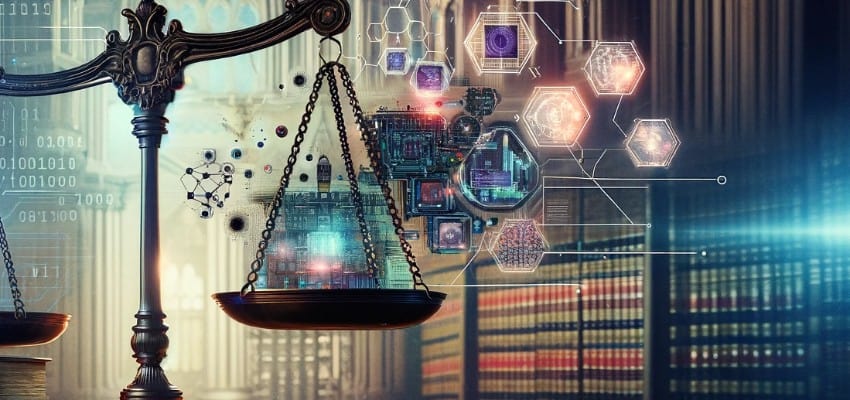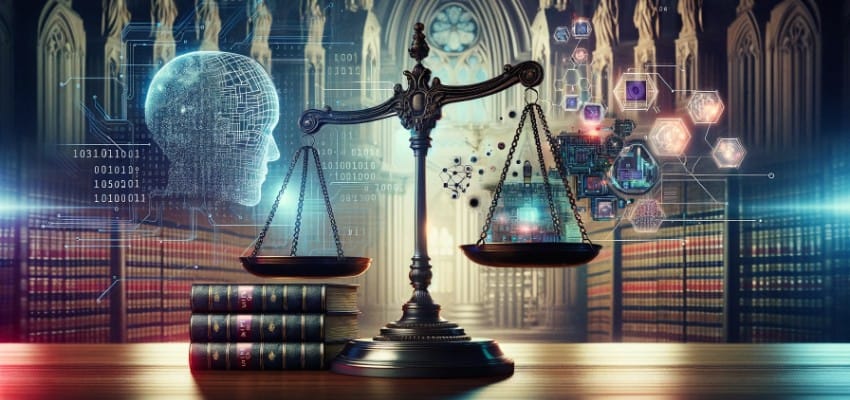|
|
Content Assessment: UK Judiciary's Cautious Embrace of AI in Legal Processes
Information - 92%
Insight - 90%
Relevance - 93%
Objectivity - 90%
Authority - 89%
91%
Excellent
A short percentage-based assessment of the qualitative benefit expressed as a percentage of positive reception of the recent article titled "UK Judiciary's Cautious Embrace of AI in Legal Processes" by ComplexDiscovery OÜ.
Editor’s Note: The article “UK Judiciary’s Cautious Embrace of AI in Legal Processes” highlights the groundbreaking integration of AI, particularly generative AI tools like OpenAI’s ChatGPT, into the judicial processes in England and Wales. It accentuates the careful and cautious approach adopted by the UK Judiciary, balancing innovation with the need for accuracy and reliability in legal contexts. The narrative emphasizes the potential efficiencies AI could bring to administrative tasks while stressing the prohibition of its use in legal research and analysis. The article addresses concerns over AI misuse, emphasizing training for judges to identify AI-generated content. It also reflects on the UK’s broader commitment to AI development and safety, noting collaborations with major AI developers. This development is a consequential step in the judiciary’s adaptation to technological advancements while maintaining a critical and cautious stance toward AI’s role in legal procedures.
Industry News
UK Judiciary’s Cautious Embrace of AI in Legal Processes
ComplexDiscovery Staff
In an exceptional development, judges across England and Wales are stepping into a new era of the judiciary process, where artificial intelligence (AI) is set to reshape their work environment. Official guidance from the UK Judicial Office has given the green light for judges to utilize AI tools like OpenAI’s ChatGPT, albeit with a cautionary approach towards tasks that are of a legal nature.
The guidance marks a key moment in legal proceedings where generative AI systems can be employed for administrative tasks such as summarizing texts and crafting emails. This move could signal the beginning of a significant transformation in the way the judiciary operates, paving the way for cutting-edge technology to assist in the efficient administration of justice. However, the directives firmly prohibit the deployment of these AI systems for conducting legal research or producing legal analyses.
Concerns have emerged regarding the potential misuse of AI. In one notable case, a lawyer unsuccessfully attempted to leverage ChatGPT to draft a court brief, resulting in a penalty for citing non-existent cases, stirring debate over the reliability of AI in such high-stakes environments. To ensure vigilance, judges are being trained to distinguish between authentic legal submissions and those possibly crafted by AI, a skill that is increasingly pertinent as deepfakes and other AI-generated fabrications infiltrate legal evidence.
According to Sir Geoffrey Vos, England’s second most senior judge, AI harbors “great opportunities for the justice system.” Still, there’s an imperative need to ensure that jurists comprehend its utility and limitations. His statement elucidates the optimistic yet cautious stance taken by the judiciary towards the integration of AI.
The UK government is not merely experimenting within its courts; it is actively advancing on the global AI stage. The nation has recognized AI’s strategic significance and is bolstering efforts to nurture its development. A recent white paper advocating AI’s adoption and the tripling of funding for the AI Research Resource highlights the UK’s commitment to being at the forefront of AI safety and management.
Collaboration between renowned AI developers such as OpenAI, Anthropic, Google DeepMind, Microsoft, Meta, and xAI with the UK government asserts the country’s position as a collaborative force in the responsible progression of AI technologies. The worldwide AI community is taking note as the UK leads by example, embracing the transformative power of AI while vigilantly navigating its challenges.
The issuance of AI guidelines by the Civil Justice in England and Wales symbolizes the judiciary’s openness to technological advancement but also underlines the complexity and necessity of regulating such powerful tools. Judges are advised to approach AI-generated information critically, as it may be influenced by laws from jurisdictions like the United States and could be inaccurate or misleading when representing English law.
Judges in the UK are not currently required to disclose their use of AI in preparing judgments. However, the judicial guidance offers the first steps towards encouraging informed interactions with AI technologies and proposes a survey for judges to voice questions and concerns.
Globally, the conversation about AI safety is gaining traction. The UK’s inaugural AI Safety Summit and the European Union’s agreement on AI regulation indicate a growing awareness and concerted effort to address the complexities of AI integration into society.
As AI continues to evolve, its role within legal systems across the world will undoubtedly keep expanding, presenting both challenges and opportunities. The United Kingdom’s proactive approach ensures judges adopt a responsible use of AI, balancing the benefits of efficiency and precision with the imperative of maintaining the integrity of legal processes.
News Sources
- UK Judges Allowed to Use AI to Write Legal Rulings Despite Risk of ‘Hallucinations’
- AI guidance for judges in England and Wales warns against risks
- United Kingdom Issues Generative AI Utilization Guidance for Court Judges
Assisted by GAI and LLM Technologies
Additional Reading
- EU’s Artificial Intelligence Act: A Model for Responsible AI
- Exploring the Uptake of LLMs and Generative Artificial Intelligence in the eDiscovery Ecosystem
Source: ComplexDiscovery























